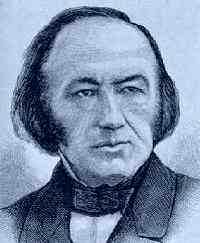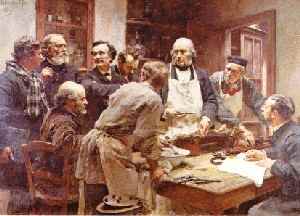

The Discovery of Bioelectricity:
Renato M.E. Sabbatini, PhD
 Claude Bernard was a French physiologist, one of the most important of all times, and who
is considered the "father" of modern experimental physiology.
Claude Bernard was a French physiologist, one of the most important of all times, and who
is considered the "father" of modern experimental physiology.
He was born on July, 12th 1813 in a farm in Saint-Julien, department of Rhône, which today houses the Musée Claude Bernard, set up by the Mérieux Foundation. His father was a modest winegrower in Beaujolais country.
In 1830 he moved to Paris to study, obtained his baccalaureate and started Medicine in 1835. He obtained his medical degree at 29 years of age, in 1843, under François Magendie, chairman of Physiology in the Collège de France.
Claude Bernard's first important works were carried out on the physiology of digestion, particularly the rôle of the pancreas exocrine gland, the gastric juices and of the intestines. The study of internal metabolism was also one of his main fields of interest, and he contributed to the understanding of glycogenesis in the liver. Bernard is also credited with two further major scientific achievements: the discovery of vasodilation and vasoconstriction by means of the vasomotor nerves, and the study of the effect of curare on the neuromuscular system. In addition to this, Bernard also made other important contributions to the neurosciences, such as the study of sensory nerves, of the chorda tympani and of the cephalospinal fluid. Ten years after graduating in Medicine he obtained brilliantly a doctorate in sciences (zoology).
Claude Bernard was responsible for a major breakthrough in understanding the fundamental principles of organic life, one that is valid still today. It is his concept of "homeostasis", or controlled stability of the internal milieu, or internal environment, of cells and tissues. He proposed that "the fixity of the internal environment is the condition for free life", and explained that:
"The living body, though it has need of the surrounding environment, is nevertheless relatively independent of it. This independence which the organism has of its external environment, derives from the fact that in the living being, the tissues are in fact withdrawn from direct external influences and are protected by a veritable internal environment which is constituted, in particular, by the fluids circulating in the body."
In the second half ot the century, the view that cells were the fundamental building blocks of structure and function in the organism was a new concept, as proposed by scientists such as pathologist Rudolf Virchow, and neuroanatomists Camilo Golgi and Ramon y Cajal. Claude Bernard added the physiological thinking to the cell doctrine. Bernard's prolific experimental investigations were also responsible for correlating nervous action with the control of metabolism, circulation and respiration, thus introducing the revolutionary concept (for the time) of feedback control loops, or how certain systems work as homeostatic devices. This gave birth, a hundred years later, to cybernetics, the science of system control.
 He was a champion of the rigorous experimental approach, based on a strict marriage between
physiology and the underlying laws of physics and chemistry being discovered at an enormous rate in that time.
He was considered an excellent methodologist and was a great inventor of physiological techniques. He famously
said that "the laboratory is
the temple of the science of medicine."
His most important book, the "Introduction to the Study of Experimental Medicine", published in 1865,
was enormously influential for many decades.
He was a champion of the rigorous experimental approach, based on a strict marriage between
physiology and the underlying laws of physics and chemistry being discovered at an enormous rate in that time.
He was considered an excellent methodologist and was a great inventor of physiological techniques. He famously
said that "the laboratory is
the temple of the science of medicine."
His most important book, the "Introduction to the Study of Experimental Medicine", published in 1865,
was enormously influential for many decades.
By virtue of his discoveries and influence in French medical and biological sciences, Claude Bernard became one of the most distinguished and honoured scientists in the history of that country, side by side with his friend and contemporary Louis Pasteur. In 1854 he was elected member of the French Academy of Sciences and accepted the chair of General Physiology in the Faculty of Science at Sorbonne. In the next year he was appointed professor of medicine at the famous Collège de France. He was further honoured between 1861 and 1865 with the nomination to the French Academy of Medicine, to the French Academy of Sciences, in substitution of Pierre Flourens, to the French Legion d'Honneur (first as a chevalier, then as a commander), and finally, elected Senator of France for life, in 1869. The Académie des Sciences awarded Claude Bernard the grand prix in physiology in 1849, 1851, and 1853 for his most famous discoveries.
He deceased in Paris on February, 10th, 1878. One of Paris universities was named in his honour.
To Know More
Renato M.E. Sabbatini, PhD
Brain & Mind Magazine
Copyright (c) 1998 The
State University of Campinas, Brazil
Center for Biomedical Informatics